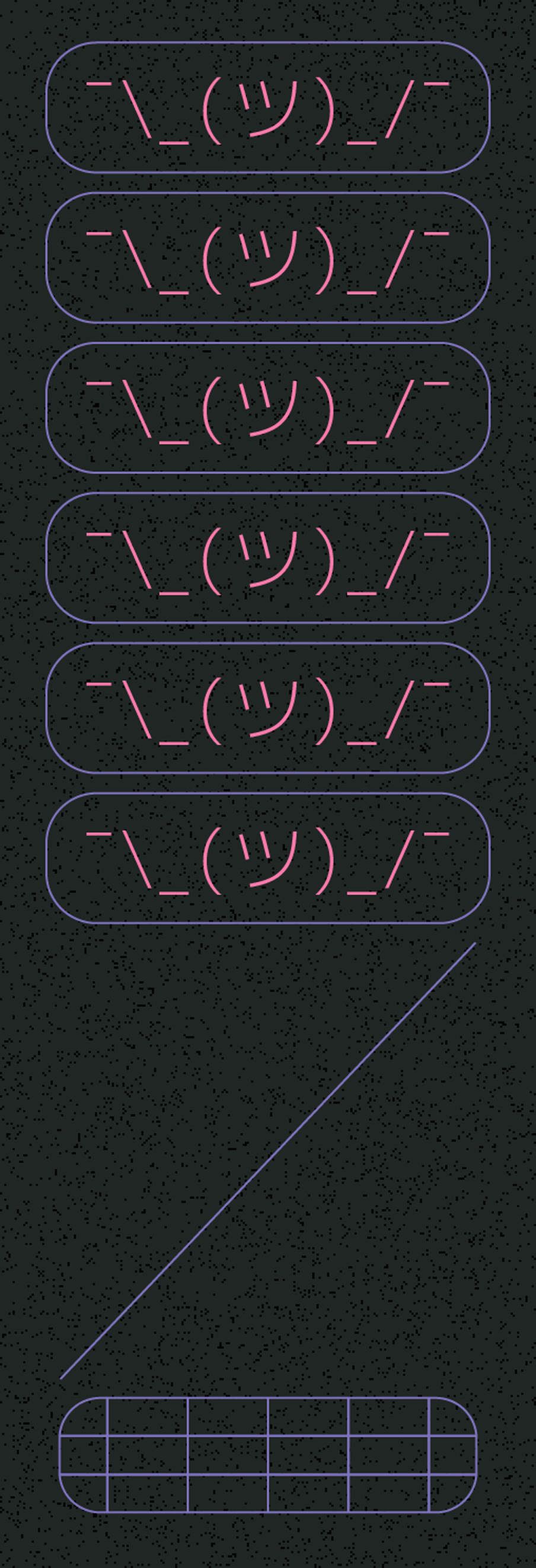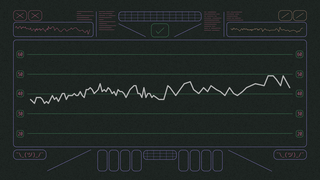This sluggish pulse is not what you think it is. Not the heartbeat of someone who is sleeping. Not the depressed cardiac pattern of a patient in intensive care. And it isn’t a broken ECG either.

It’s Donald Trump’s approval rating.
The stability of Trump’s rating since he became president of the United States is remarkable in itself. But it reveals something even more extraordinary when one zooms out for a wider picture. It’s the symbol of a completely overlooked story about American democracy.
Democracy in the US has often been declared at risk – if not actually dead, then at least on life support. That description is usually a function of turmoil.
But looking at this graph, it isn’t the instability which catches the eye. It’s the opposite: the unresponsiveness – to anything really – that is striking. American democracy isn’t dead, it’s in a coma.
A deep, worrying slumber.
Not a member of The Correspondent yet? Pay-what-you-want and join us now!
The declining pulse of American politics
This flat pulse is even more jarring when contrasted with the events that have played out over this time. Trump’s rating is impervious to an extremely polarised media coverage, an impeachment trial, and the worst pandemic in modern history.
It’s tempting to see this stagnation as the result of recent political shifts, but the election of Donald Trump and the polarisation of American politics has been years in the making, a sequence of economic and political events spanning the past half-century. Trump’s rating reveals the evolution, and the health, of American democracy.
Inertia persists while analysts clutch their pearls in horror at his litany of violations
This tell-tale rating isn’t high, but it’s not low either. Both Trump’s approval and disapproval metrics seem to float within a range of variation of only 6-7%. Over the past four years, the approval has stabilised in the low 40s.
In that time, the American body politic has experienced the equivalent of extended interval training; that is, regular spikes in activity and stress. Yet even as that body is breaking into a sweat, then hyperventilating, the heartbeat remains constant.

This rating is unmoved by daily shocks and outrage at Trump’s suspension of almost every single convention in American politics. It’s immune to the reams of investigative journalism exposing Trump’s tax evasion or unethical business interests. The inertia persists while analysts clutch their pearls in horror at his litany of violations.
It’s even immune to optimism: the hopeful coverage that seeks to redeem Trump by imputing some logic of coherence to his random actions.
So unequipped are we to deal with his narcissistic incoherence that Trump is often described by commentators as finally "getting it", finally becoming "presidential". This despite the fact that he always lapses back into peevish egotism after whatever short-lived "presidential" form he might appear to have found.
Arguably, this gap between controversy, media coverage and the president’s approval rating can still be explained. Not everyone watches the news. A certain level of fatigue sets in. The media landscape has fragmented so much that consumers can filter their information diet to those outlets that reflect their worldview.
These are all valid arguments that can go some way towards understanding why the media rhythm is out of sync with popular perception.
But the pulse has become utterly unresponsive to events as well.
It’s indifferent to Trump’s blatant attempt to bribe the president of Ukraine; to the impeachment that followed; to his siding with Russian president Vladimir Putin over his own intelligence agencies; to a litany of sexual harassment and rape allegations; to a clown car of senior officials exiting the White House – that all tell stories of chaos and dysfunction.
A pulse which even defies the pandemic
Today, Trump’s rating is unresponsive even to the biggest crisis in living memory – a global pandemic that cost millions of Americans their jobs almost overnight. Already, as I write, its death toll is a staggering 40,000 lives – in a matter of weeks. (That’s ten 9/11s or the entire calamitous American death toll in Vietnam – and counting.)
In a time of unprecedented volatility, the real story is away from the drama. The constant thread – through the enormity of the change that American politics has undergone in the space of three years, all the high octane action – is the unresponsiveness of the approval rating.
The flatlining is part of a larger pattern, tracing the desensitisation of Americans and the erosion of the public sphere
Trump’s behaviour, and his ability to get away with it, can’t be explained by claims that he is some kind of master communicator, as some theorists have suggested. Nor, as others have it, that somehow he magically connects with his white working class base. His proclivities go unchecked because the lawlessness is anchored to a bedrock of support that has become indifferent: to the president, to the state of the nation, to the world at large.
It’s easy to imagine this indifference has been the case forever. But it’s a clear break with history. Previously, presidents’ ratings went up or down as a function of economics, scandal or war. Not long ago the ratings moved even in response to critical media coverage (difficult though it might be to imagine, or remember. But such a time existed).
Tracing the approval ratings of US presidents since Lyndon B. Johnson, you see a clear heartbeat, fluctuating with events and presidential performance. This was the case until Trump, when for the first time there appears what looks like a definitive separation of opinion and reality – an almost flat line.


















Now that this separation is clearly visible, the next question is, of course: why? And why now? The answer is nothing less than a political terminus after years of economic policies which have degraded democracy.
The flatlining is part of a larger pattern of the desensitisation of the American public to politics. The decline traces the erosion of the public sphere, and the instrumentalisation of identity by powerful actors unwilling to share their power.
Underlying this change is a party loyalty that has been elevated above competence – or the lack of it. As The Economist observed: "It’s no longer the economy stupid. It’s the partisanship". This trend preceded Trump, but has solidified during his tenure.
Despite the popular narrative that his support is attributable to say, left-behind coal miners who hope and believe he can restore their livelihoods, Trump’s base actually expects little from him. His role is not to defend rights, nor provide public services, nor even to improve their economic fortunes.
He is there simply to be.
The beginnings of the end
And here’s where a long history comes in. This degradation of American politics into mere symbolism isn’t caused by Trump: it’s the culmination of 40 years of Reaganism, of the wholesale privatisation of the public sphere, and aggressive promotion of the notion that only personal enterprise determines success.
Over time, these factors constrain the role of government to just two roles: management of the practical parts of governance, and symbolism.
Many expect next to nothing from politics – nothing of substance, beyond the background noise of daily news. For them, the occupant of the White House is not in office to further any causes, be they ideological or practical. The president is there as an avatar: the cultural projection of his followers’ tastes, grievances and grudges.
There is no ‘public’ in the privatised post-democracy democracy
In this new landscape, political choices are loyalties – akin to picking a football team and sticking with it through triumph, relegation and internal scandal. Whether a football team or a president, the avatar gives voice to its supporters’ sense of tribalism. All the attendant sensations – rush of blood to the head, narratives of glory and triumph, clan mythology – are experienced vicariously.
These impulses may be relatively harmless when confined to sports, but when they are extended to politics, they effectively underwrite authoritarianism.
This privatisation of politics has degraded and excised the very notion of public service from the political sphere. Trump’s base is not his "public" as such, not a cohort of citizens who view the government as an elected body to further their tangible interests.
The endpoint of decades of fetishising small government is that, eventually, there will be born a citizen who does not see Washington as relevant to their daily life at all.
There is much evidence, already, that we are nearing this point. Trump supporters are characterised by a paradoxical mix of apathy and unshakable loyalty. A study by Monmouth University found that among respondents who approve of the job Donald Trump is doing as president, 62% “can’t think of anything he could do that would cause him to lose their support”. The poll was conducted in the middle of Trump’s impeachment inquiry.
The term “post-democracy”, coined by political scientist Colin Crouch, describes a state where electoral politics is restricted to a limited number of issues, while the crucial needs of the citizenry are addressed by the private sector. These companies lobby politicians, who may be in hock to them. Corporate agenda enacted by elected representatives might look like ideology – the right to own firearms, for example, or not to pay tax for someone else’s healthcare – but they are in fact determined by commercial interest.
The personalisation of politics
The privatisation of politics came hand in hand with another phenomenon that exacerbated this disconnect between politics as a vehicle to bring about tangible results in one’s life. It is the personalisation of politics – better known as "identity politics".
As a symbolic figure, the president is primarily a promoter, and validator, of grievance on behalf of a powerful male, white, heteronormative identity. He projects its gripes on to other identities perceived as competing unfairly for its share of the pie.
Trump’s cruelty is performative. It signals privilege for the ‘right’ sort of person, the right sort of American
That’s why Trump made Muslims and Mexicans a main target in his presidential campaign: to communicate his intolerance for the other. His other pronouncements have played on this theme of restoring hierarchy: his infamous recorded comment about grabbing women by the pussy was, he said, “locker room” talk; fatalities during white supremacist marches were the fault of “both sides”, and so on.
Cruelty to others, and by association the solidifying of the status of white heteronormative power, became the main political currency. To the dispossessed, in the absence of economic gains, there were at least going to be spiteful ones. "The cruelty is the point", as The Atlantic’s Adam Serwer concluded.
The separation of migrants and their children at borders; the caging of those children in inhumane conditions; the mockery of the disabled during Trump’s presidential campaign, of parents who have lost their children in wars, of dead opponents such as John McCain, of closing borders and splitting up families – the cruelty of these events is not marginal to them, to some larger ideology or principle being enacted.
Trump’s cruelty is performative. It signals that there are privileges that are only extended to the "right" sort of person, the right sort of American.
The Republican Party actually is the minority party, losing the culture war
Which brings us to a widely held myth, namely that despite the constant refrain that political solidarity is being fractured by "identity politics" by people of colour, LGBTQ+ people, and women in particular, Trump’s support actually is the most potent practice of identity politics in America today. Although the Republican party seems to be all powerful, having captured the White House, the Senate, and the Supreme Court, the so-called Grand Old Party is essentially America’s minority party.
On cornerstone social issues of abortion, same sex marriage, and popular culture – conservatism has suffered a massive defeat
Demographic patterns are not in its favour. By the end of this year, a majority of Americans under-18 will be non-white. By the end of this decade, the non-white population will be a majority among under-30s. Republicans cannot curb this trend. “Not a single demographic megatrend ... favours Republicans,” journalists Jim VandeHei and Mike Allen of Axios reported.
The Republican party cannot expect to win the electoral college while losing the popular vote forever. One day, the tipping point will be reached.

The looming crisis of Republicanism is, more broadly, a crisis of conservatism. In spite of its dominance, conservatism in the US has lost the culture war. It won recent battles by harnessing regressive notions of identity and supremacy (see also Brexit in the UK). But the demographic cohort which cares about these issues – the support base reflected in the craggy line of Trump’s rating – is on its way to being outnumbered.
On almost every single cornerstone social issue – abortion, same sex marriage, popular culture – conservatism has suffered a massive defeat. Recently a federal judge in Alabama (!) ruled that abortions cannot be banned or classified as "elective" procedures under the state’s response to coronavirus. Even Trump’s flagship Muslim ban policy – a "win" for conservative nativism – was itself suspended, delayed in the courts, then watered down before it became law.
There is simply no ideological formula upon which conservatism can land, that can claw back the social and ideological losses incurred over the past 50 years. Its current dominance is a last hurrah, a bright star in a supernova before it collapses on itself.
As Republican senator Lindsey Graham put it bluntly, in 2012: “We’re not generating enough angry white guys to stay in business for the long term.”
Outrage to no effect
For those conservatives who are not fans of Trump, there is no alternative for the Republican party but to hold on to him for dear life. Support for him is, therefore, not a waxing and waning metric based on rational calculations. It’s a death grip. Not a single finger can release its hold on the edge of a precipice.
American exceptionalism fetishises the freedom of every individual to determine their fate
In this sense, Trump’s mandate has ceased to be a democratic one. Nothing demonstrates that better than his transparent failure to protect American lives and the American economy during the coronavirus pandemic. If this has not shaken it, nothing will. Trump’s prophecy, that he could shoot someone walking down Fifth Avenue with impunity, has come to pass; if not literally, then metaphorically.
The prism through which to explain this impunity, and what is happening to American politics more generally, is sectarianism. The link between popularity and a president’s record in office, between perception of reality and what actually is happening, has broken.
America’s political voyage, an endeavour often imbued with an exceptionalism that fetishises the freedom of every individual to determine their fate, seems to be reaching an unintended destination: the resignation of every individual to their fate.
The media and political classes can circle the president, focusing on his outrageous behaviours, for as long as they like; but will never be able to lay a glove on him. The real story, the only constant, is the deeply ingrained indifference of Trump’s supporters to what is going on.
Like a thermometer in which the mercury is expired, American democracy is frozen. Its thawing is not dependent on Trump finally crossing a line that will jolt it out of this state of suspension. It is contingent on the demographic demise of the Republican party – and the revival of public service in politics.
Until then, Trump can, and will, do whatever he likes.
Dig deeper
 Coming right up after the break ... why most TV ads are a waste of money
Brands pay billions annually to bombard us with television adverts. But new research reveals what the marketing department won’t: big spending on the small screen isn’t just annoying – it’s also pretty ineffective.
Coming right up after the break ... why most TV ads are a waste of money
Brands pay billions annually to bombard us with television adverts. But new research reveals what the marketing department won’t: big spending on the small screen isn’t just annoying – it’s also pretty ineffective.
 Love, sweat and leaflets: how the same-sex marriage movement won in Ireland
Tim Curran is general secretary of Ireland’s largest political party, Fine Gael, a liberal conservative party, who describes himself as "a card-carrying, practising Catholic". He’s also a father of a gay son.
Love, sweat and leaflets: how the same-sex marriage movement won in Ireland
Tim Curran is general secretary of Ireland’s largest political party, Fine Gael, a liberal conservative party, who describes himself as "a card-carrying, practising Catholic". He’s also a father of a gay son.


